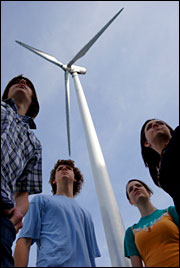As an undergrad at Brown University and a veteran organizer with the Sierra Student Coalition, Nathan Wyeth has his ear to the ground on campus sustainability issues. In this occasional column for Grist, Wyeth will report on what’s afoot at the campus grassroots level and how he and his fellow students are making their voices heard.
 As of today, 202 colleges and universities have pledged to move toward climate neutrality, or net-zero global warming emissions, with the American College and University Presidents’ Climate Commitment. I’ve been part of a student group pushing Brown University to do the same.
As of today, 202 colleges and universities have pledged to move toward climate neutrality, or net-zero global warming emissions, with the American College and University Presidents’ Climate Commitment. I’ve been part of a student group pushing Brown University to do the same.
But debate over the legitimacy of the “carbon offsets” that make climate neutrality possible is growing as fast as the number of companies, institutions, even countries that have committed to buying them. Are carbon offsets legit? And what does climate neutrality really mean?
For the past few months, I’ve been considering a phrase tossed out by my friend and fellow student organizer Billy Parish: climate positive. Consider it a step beyond climate neutral (which never had a very inspiring ring to it anyway) — when institutions or individuals not only take responsibility for their own impact on the climate and our future but go beyond this to have a positive climate impact on the community around them.
The emPOWER Campaign at Brown works under the banner of the Campus Climate Challenge, and we’re aiming for climate neutrality by 2008. But we’re not just making demands — students are at the center of creating the action plan.
When our campaign began, we started by trying to decide how much renewable energy Brown should commit to buying and then determining a year by which we should go climate neutral. But then we decided that if we were going to go climate neutral, it only made sense to do so now.
At its core, climate neutrality is, for us, a deeply moral message: If climate change is real, and if it is going to hurt people, then to continue to take part in causing it is wrong. Climate neutrality is how we want our school to take responsibility for its role in creating — and now solving — the climate crisis.
But knowing that offsets are fraught with questions and controversy, our Sunday evening meetings in the living room of the environmental co-op have been consumed with questions: Can we can guarantee that offsets bought from a company like TerraPass or NativeEnergy will deliver on their carbon-reduction promises? When is it OK to stop reducing on-campus emissions and turn to offsets? What university-related emissions should be included in a calculation of neutrality? Food? Paper? How about professor travel for research?
The official university committee tasked with creating a new energy policy for the school incorporated our goal of neutrality after much student pressure, and then struggled with the same questions.
The climate neutrality strategy now awaiting approval from Brown’s Board of Trustees suggests setting an ambitious carbon-reduction target (the gold standard of 80 percent by 2050) and offsetting 100 percent of the remaining emissions — with as much as possible done locally.
Initially, offsets will be purchased from a private company, but then we’ll move toward student- and professor-initiated projects like weatherizing low-income housing in Providence, R.I., distributing CFLs for off-campus use, encouraging local public transit, and more. A committee of experts at the university would evaluate proposed projects and quantify the carbon reductions off campus that can be realistically expected to result. Money will then be reallocated from purchasing offsets to investing locally. To her credit, Brown University President Ruth Simmons is considering how these projects can spur economic development in Providence, creating “green collar” jobs.
This is a new model for how institutions can move toward climate neutrality — by investing locally and avoiding the pitfalls of sketchy, anonymous offset schemes on the other side of the world. By being local, these offsets will not only be real and quantifiable, they’ll be happening in front of the students at Brown and the citizens of Providence. They’ll be showing people the solutions that can make our lives better, and will hopefully spur further action throughout the city.
Wish us luck that Brown University will move forward with this plan, becoming not only the largest university to offset 100 percent of its emissions as of 2008 but the very first to go climate positive.

Nathan Wyeth is an undergraduate student concentrating in Development Studies at Brown University. A Sierra Student Coalition organizer, he currently serves on the Sierra Club Board of Directors. He has led national grassroots campaigns to end the World Bank’s investment in oil, gas, and mining, and protect the Arctic National Wildlife Refuge.
 As of today, 202 colleges and universities have pledged to move toward climate neutrality, or net-zero global warming emissions, with the
As of today, 202 colleges and universities have pledged to move toward climate neutrality, or net-zero global warming emissions, with the 
